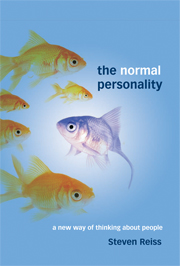Book contents
- Frontmatter
- Contents
- Acknowledgments
- Overview
- 1 My Wife Thinks Something Is Wrong with Me
- 2 The Sixteen Basic Desires
- 3 Intensity of Basic Motivation
- 4 Normal Personality Types
- 5 Overcoming Personal Troubles
- 6 Six Reasons for Adolescent Underachievement
- 7 Self-Hugging and Personal Blind Spots
- 8 Relationships
- 9 Reinterpretation of Myers-Briggs Personality Types
- 10 The Sixteen Principles of Motivation
- APPENDIX A Dictionary of Normal Personality Traits
- APPENDIX B Reiss Motivation Profile Estimator
- APPENDIX C The Sixteen Basic Desires at a Glance
- Notes
- References
- Index
7 - Self-Hugging and Personal Blind Spots
Published online by Cambridge University Press: 05 June 2012
- Frontmatter
- Contents
- Acknowledgments
- Overview
- 1 My Wife Thinks Something Is Wrong with Me
- 2 The Sixteen Basic Desires
- 3 Intensity of Basic Motivation
- 4 Normal Personality Types
- 5 Overcoming Personal Troubles
- 6 Six Reasons for Adolescent Underachievement
- 7 Self-Hugging and Personal Blind Spots
- 8 Relationships
- 9 Reinterpretation of Myers-Briggs Personality Types
- 10 The Sixteen Principles of Motivation
- APPENDIX A Dictionary of Normal Personality Traits
- APPENDIX B Reiss Motivation Profile Estimator
- APPENDIX C The Sixteen Basic Desires at a Glance
- Notes
- References
- Index
Summary
I came across George Ramsay's 1843 book on the nature of happiness when I was working on a research project in the library stacks at Ohio State University. The pages were discolored and brittle from more than 150 years of exposure to the elements, but I did my best to read as much as I could. The following passage caught my attention:
The same difference of feeling and dullness of imagination in men explain what often has been observed, that one half of mankind pass their lives in wondering at the pursuits of the other. Not being able either to feel or to fancy the pleasure derived from the other sources than their own, they consider the rest of the world as little better than fools, who follow empty baubles. They hug themselves as the only wise, while in truth they are only narrow-minded.
I have pondered the meaning of these words for years. I now suspect that George Ramsay — an obscure, nineteenth-century professor of philosophy at Oxford University in England — had unlocked the psychological secrets of long-term relationships. His idea of “self-hugging,” I now believe, explains why people with opposite pursuits tend to misunderstand each other and quarrel repeatedly.
Self-hugging is a natural tendency to think that our values are best, not just for us, but potentially for everyone. When people learn that a particular lifestyle makes them happy, they think they have learned something about human nature, when in reality they have only learned something about themselves.
- Type
- Chapter
- Information
- The Normal PersonalityA New Way of Thinking about People, pp. 99 - 109Publisher: Cambridge University PressPrint publication year: 2008

